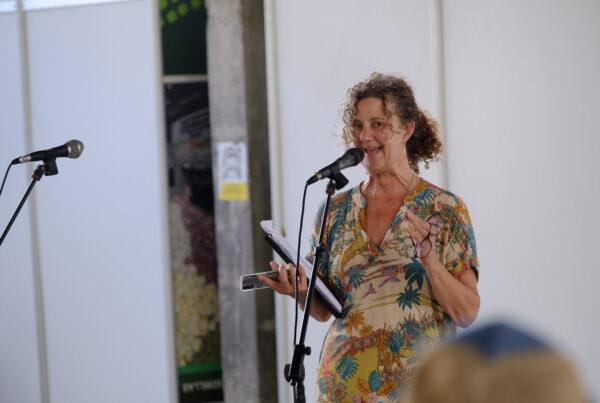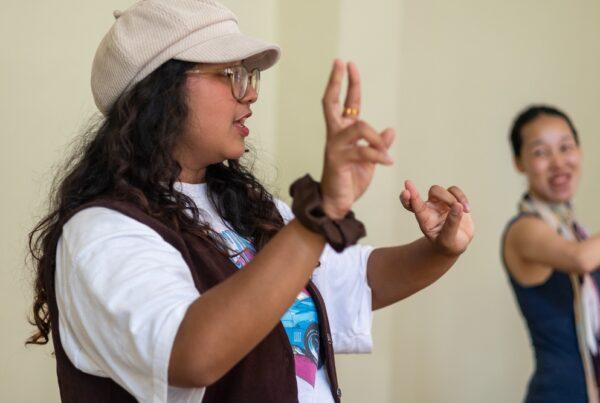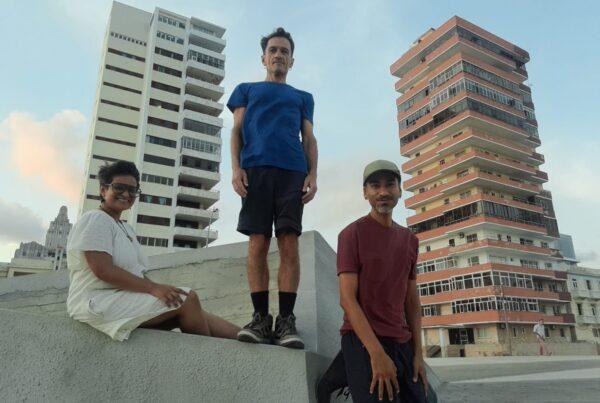Two actresses and drama pedagogues led the 8 children that took part in the ‘Voices Of Children: This is what we saw’ programme, each identifying the importance of such experiences for both the children and the mentors themselves.
I was actually very curious about the children’s reactions on performances because the way we planned these workshops and this whole week with children, we purposely chose performances that are very different to what they are used to, especially here in Novi Sad,” says Slavica Vučetić, one of the mentors. “Most of their reactions were really positive, even though some of the plays were performed in foreign languages or different theatrical language, for example, contemporary dance, I suppose that through these workshops, we had ‘prepared’ them before watching the performance, and they really understood it and reacted positively,” she adds.
“During the several days of workshops we had with this beautiful group of 8, we managed to explore their thoughts on theatre in general, different forms they are (or not) familiar with, what intrigues them most, what they find interesting and engaging, what they find hard to understand and communicate with, how they perceive specific stage languages…,” reveals Milica Šećerov, the second mentor of the programme.

“We, as facilitators, used various drama strategies to open up the process for the group. We started with getting to know them and their previous experience, moved on to opening up the context of specific performances we were about to attend, tried to explore the way the perceive different forms and approaches, and during our last session – we helped them express ’what they saw’, by letting them choose their own way and form,” reveals Milica Šećerov.
Both as an actress and as a drama pedagogue, I’m absolutely sure that these kind of workshops, or at least discussion, is a must prior to watching the performances. So somebody, not necessarily a theatre pedagogue, but maybe a teacher in the school, or a dramaturge in the theatre should prepare children about the topic or about the style of the performance. And it really is something that changes their perception and their understanding of the performance,” adds Vučetić.
As far asssesing what has happened during the week now that it’s over, Šećerov asserts that these kind of workshops, can help children engage more during the performances. “By extending the engagement after the performance itself, we can make sure that their impressions get a chance to be processed and expressed through various creative ways. For us who are engaged in creating TYA, it’s of great importance to listen very carefully to these voices who are meant to be our guide: are we doing it good enough, are we managing to address themes that are relevant to them, are we paying enough attention to their point of view, are we listening to the ’language’ they use to express themselves and are we helping to create a safe space for that expression; are we shifting perspectives in order to create new meaning and understanding of the world we live in? Are we letting the young audience ’navigate’ the future of TYA?,” says Šećerov.

“Having that in mind – the voices of children are the voices we should follow in order to be sure that theatre we make is the theatre they want to participate in. That is why I personally believe that this project is extremely relevant: it’s an opportunity for them to share their impressions on the performances they witnessed, but also to engage in work they might have never had the opportunity to – or at least not in these specific frames,” adds Šećerov.
“For me, as an actress, but also a drama pedagogue/applied theatre practitioner, the Turning Point would be precisely this: listening to Voices of Children, and helping these voices get heard through various forms of participatory theatre,” she concludes.
From the children’s perspective
On the last day of the programme, the mentors did a survey with the children who answered questions about their experience throughout the programme.
In a nutshell the survey revealed that the children were really excited about their participation and liked the performances they attended. “Even though the performance are different in the sense of theatre form and aesthetics, I managed to understand it,” said one participant. Another participants, a young girl, said that sometimes she wasn’t sure wether she understood the play, but she felt good about it.
Overall, the workshops helped them understand the performance and liked the fact that they were working in a group and that the whole group was talking about the theatre. Some of the performances, such as the Kurt, Quo Vadis performance reminded them what is really important in life. They leant something new, not only about life but also about the technical aspect of how theatre works and know how something is technically feasible on stage. They also said that they would be happy to participate in the programme again in the future.
Slavica Vučetić, actress and drama pedagogue, member of the Youth Theatre ensemble, MA at the UNESCO Department of Cultural Policy and Management in Culture, University of Arts in Belgrade.
Milica Šećerov, actress, drama pedagogue, lecturer and senior associate at the Academy of Arts in Novi Sad. She studied drama pedagogy and applied theatre in Bergen at the University of Western Norway.

Divna Stojanov is a dramaturg and playwright. She also writes theatre reviews.

Melissa Hekkers is a freelance journalist and author.
Her most recent book, Amir’s Blue Elephant, a creative non-fiction based on her experiences working in the Moria refugee camp in Lesvos, Greece and Cyprus. In 2018, she launched the My Cyprus Mandala Series, colouring books inspired by the natural and cultural heritage of Cyprus. In 2007, she published her first children’s book in both English and Greek entitled Crocodile, which won the Cyprus State Illustration Award. In 2012, she launched her second children’s book Flying across Red Skies (in English and Greek), using an experimental approach to literature, for which she was nominated for the Cyprus State Literary award. Her third, similarly well-received children’s book was Pupa (Greek and English), published in 2014 and was adapted as a theatre play in 2019. In between her last two books, she published her first free-verse poetry book entitled Come-forth. In 2019 she was contributing author to the anthology Nicosia Beyond Barriers: Voices from a Divided City, published by Saqi Books, London.





